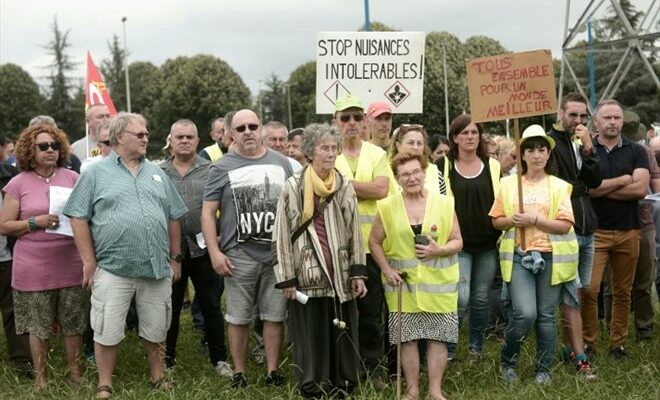Methanization tanks on the TotalEnergies BioBearn site in Mourenx, in the Pyrénées-Atlantiques, February 16, 2023 (AFP/Archives/GAIZKA IROZ)
Scents of curry, popcorn or garlic: in the industrial basin of Lacq (Pyrénées-Atlantiques), local residents and industrialists learn a common language of “noses”, in order to detect possible malfunctions in surrounding factories, such as those of a methanizer in October.
The tabs, similar to those in perfumeries, go around the table. In Lacq, not far from the largest natural gas deposit exploited in the South-West for 60 years, around fifteen people meet every month for olfactory “review sessions”.
Sarah Le Bail, design engineer for Atmo Nouvelle-Aquitaine, the organization which monitors air quality, runs this “Lacq Basin Odor Observatory” created in 2016, after an increase in complaints from local residents.

Demonstrators protest against the odors emitted by the TotalEnergies methanization plant, October 26, 2023, in Mourenx, in the Pyrénées-Atlantiques (AFP/Archives/GAIZKA IROZ)
At the end of October again, around fifty demonstrators denounced the “pestilential” odors from a TotalEnergies biogas production plant. The site management recognized a “plant waste storage problem” and promised to find solutions.
The idea is simple: to train those first concerned in a common language, to give names of specific chemical molecules to odors, rather than speaking in evocations, which are too personal.
– Real-time alerts –
In the event of peaks in intensity, a common platform, called Signal’Air, collects alerts. They reach company control units in real time which, from a certain threshold, launch checks.
“Without this language, we would have an influx of heterogeneous reports which would not make it possible to objectify things,” explains Yves Le Borgne for UniversLacq, an association which brings together 15 industrialists in the basin.

The Sanofi factory, member of UniversLack, in Mourenx, in the Pyrénées-Atlantiques, July 1, 2019 (AFP/Archives/IROZ GAIZKA)
“We drew up an olfactory identity card for companies, in order to be able to associate smells with them,” continues Sarah Le Bail. The Lacq industries, divided into four platforms, represent a third of the chemistry in New Aquitaine.
Recently, reported odors helped detect saturation of the effluent treatment plant of different factories. “We sent all our effluents at the same time, so we just had to coordinate on times to prevent it from happening again,” argues Yves Le Borgne, also in charge of communications for Sobegi, a chemical products manufacturer, a subsidiary of the group. Total.
The creation of the Observatory was motivated by the transformation of the basin which welcomed new types of industries from the 2010s, with their share of new, unknown and above all irritating odors.
“There was a lot of tension but we wanted to help the industrialists progress and since then things have improved,” considers Gervais Cillaire, volunteer “nose”, first deputy at the town hall of Lacq and president of Arsil, a local residents’ association. at the origin of the initiative.
– Recruit new “noses” –
The company Arkema, the largest provider of jobs in the basin with its 750 employees, ensures that it will invest in 2024 and 2025 to “further reduce odorous emissions” of dimethyl disulfide – an additive used in the production of fuels, recognizable by its garlicky smell – “at least 80%”. It had invested 7 million euros between 2016 and 2021 for its sulfur residue recovery unit.

Residents protest against the nuisances at the Sanofi factory in Mourenx, in the Pyrénées-Atlantiques, on July 1, 2019 (AFP/Archives/IROZ GAIZKA)
Sandrine Clavé has been a “nose” since 2018. This resident of the Lacq basin “always” has invested in understanding the strong odors around her home and contributing to “things changing”. Today she believes she has better communication with manufacturers, even if “changes always take too long for us”.
“At the beginning, we were seen as more of a pain in the ass whereas now, it’s more transparent. I am aware of the importance of jobs here, my goal is not at all zero industry, just improvement” , she adds.
In September 2024, a new recruitment session for volunteer “noses” is planned because some get tired or don’t always come regularly. A drop in reports does not “necessarily mean that things are getting better”, underlines Sarah Le Bail.
© 2023 AFP
Did you like this article ? Share it with your friends using the buttons below.




